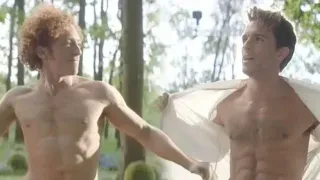March 7, 2022
Review: Frank Bruni's Memoir 'The Beauty of Dusk' a Medical and Emotional Odyssey
Brian Bromberger READ TIME: 4 MIN.
"I went to bed seeing the world one way. I woke up seeing it another," writes gay journalist Frank Bruni in his new memoir about that fateful morning in 2017 when he awoke with blurred vision resembling a thick fog.
As he later discovered, he had suffered a stroke while asleep and the drop in blood pressure damaged his optic nerve, a condition with the acronym NAION, for which there's neither a cure or treatment. He went blind in his right eye and was told by his ophthalmologist that his left eye had a 40% chance of also losing sight. The book is the medical and emotional odyssey of his drastically changed life with the wisdom he gained navigating this visual impairment, particularly deleterious for one who writes for a living.
Bruni was a White House correspondent and a restaurant critic, but is best known as a political and cultural Op-Ed columnist for the New York Times. He's currently a media professor at Duke University.
This book focuses as much about aging and mortality, as it does about vision lost and found. "These bodies of ours are time bombs, but each detonates in a different way," he writes, or in using the poetic metaphor of dusk, "It's about those first real inklings that the day isn't forever and that light inexorably fades."
But Bruni has no intention of throwing in the towel. He perseveres through his trials, which also include the end of his long romantic partnership with Tom, who falls in love with another man, and his elderly father developing dementia. Early on, he asks, "Do we give into our sadness and scaredness or do we take deliberate, concrete steps to move beyond them?"
Bruni is adamant that while we have little control over the events that strike us, "we have the final say over how we regard and react to them."
Bruni warns his readers to "brace yourself for a boatload of clichés and jump ship if they're going to bother you." And yes, the book is suffused with self-help bordering-on-New-Age jargon, which can become cloying and sentimental (i.e. When one eye closes, another opens).
But in fairness, Bruni never wallows in self-pity or defeatism. His primary coping mechanism is to profile how other people have successfully engineered their sight problems, but also other conditions, such as Parkinson's or multiple sclerosis. There are also discourses on the positive side of aging, as manifested by Ruth Bader Ginsburg, Nancy Pelosi, and President Joe Biden –rather disingenuously, since Bruni wrote articles saying he was too old to run and should've dropped out.
When the book stays on topic about Bruni's own personal resilient journey in facing a potential, at times harrowing (i.e. having a needle injected directly into his eyeball) tragedy, it mostly hits the bull's eye. When he veers into stories about how others have managed diminished vision, he begins to sound like motivational guru Tony Robbins. Are these tales supposed to persuade the reader or Bruni himself?
Insights on sight
We hear about Juan Jose, a career diplomat (Mexico's permanent representative to the United Nations) going blind due to retinitis pigmentosa, or a sightless 75-year-old judge on the US Court of Appeals for the District of Columbia Circuit, who in his interview with Bruni notes, "Starfish can regain limbs, but that's nothing compared to what human beings can do," meaning people who discover new abilities after losing other ones.
This insight leads to a long discussion on how the brain has more neuroplasticity, referring to its ability to reorganize and reinvigorate itself, than scientists once thought. We read about James Holman, a 19th-century explorer and adventurer who climbed Mt. Vesuvius, and former Nebraska Senator and Vietnam veteran Bob Kerrey (whose right foot and ankle were amputated following a grenade attack) sharing how misfortune redirected his career into politics. These vignettes of historical and current 'starfish' get to be a bit monotonous, as they all follow similar patterns. Also, is Holman climbing Mt. Vesuvius inspiring or intimidating?
Bruni shines best when he advances his "sandwich board" theory: "Imagine that our hardships, our hurdles, our demons, our pain were spelled out for everyone around us to see on a sandwich board (his own reading, "Eyesight compromised, could go blind."). We all need to understand how little we may see of the suffering of those we care about–not to mention those we only meet in passing. This is why one of the most popular and recurring social media memes is, 'Be kind to others.' You never know what someone is going through." Certainly, in these bitter divisive times, such calls for empathy and compassion are welcome.
For queer readers, one wishes Bruni had discussed the breakup of his long-term relationship more in-depth and how it impacted his recovery. There is no context provided about how the couple met or their struggles through the years.
Bruni spends two chapters on his rescue dog Regan, clearly now the love of his life, giving her far more coverage than Tom, even though as a doctor he was instrumental in the early days of Bruni's diagnosis. More expansive commentary on how being gay impacts one's disability might have enhanced the book.
Bruni seems oblivious on how having wealth and fame can make a huge difference when one is confronting a serious illness. So, we encounter top medical specialists, experimental drug trials, state-of-the-art treatments, swanky vacations to reboot oneself, and famous successful friends as advice mavens, that most people cannot draw upon as resources.
Still, despite a few missteps, Bruni's memoir is a tribute to how people adapt to life's inevitable challenges, discovering inner strengths they never suspected they had. Something bad can wind up being good for us in the long run. We can concentrate on the roadblocks or be grateful for all the things we can still do, without denying the accompanying pain, limitations, and loss.
Dusk is a bit clichéd, yet a powerful reminder that the capacity for change, in spite of our tribulations, always remains with us.
The Beauty of Dusk: On Vision Lost and Found by Frank Bruni. Avid Reader Press, $28.00 avidreaderpress.com
A ticketed online meeting with Bruni, sponsored by Book Passage, will take place on Tuesday, March 15 at 5:30 PM PST. www.bookpassage.com
Help keep the Bay Area Reporter going in these tough times. To support local, independent, LGBTQ journalism, consider becoming a BAR member.






